No Canadian companies involved in a shortened workweek trial intend to revert back to a five-day week, new research from 4 Day Week Global shows.

What’s never clear in these sorts of articles is if there was any reduction in salaries, or increase in working hours. Like are people going from working 40 hours a week to 32 with no change to their paycheck? Or are they getting paid 20% less? Or are they still working 40 hours, just over 4 days instead of 5?


I’m just guessing based on what I’ve seen elsewhere, but I think it’s fewer hours with same pay. I don’t think the pay could be less or people wouldn’t want to stay with the company, as mentioned in the article.

My employer was not part of this trial but has been doing this since Spring 2022. There’s been no increase in hours/workday or decrease in salary (and in fact, I got a raise—I think most people got at least a COLA).
We ran our own trial and the results are honestly even more positive than I would’ve thought myself.

My boss just mentioned 4 day work weeks… with the same amount of hours, I said that the idea is less hours, not the same hours crammed into less days and he absolutely refused that that is what people mean with 4 day work weeks…

I’ve been discussing this, lightly, on and off for a couple of years know, and most workers can’t wrap their head around the idea, either.
“They’ll never do that for us,” says the class the owners are completely and totally dependent on.

To be fair to your employer, he may have conflated two different kinds of 4-day work weeks.
The current discussions are mostly about 32-hour weeks, but there is a very long history of what labour law calls the “modified work week” in which the number of hours per day or days without breaks are changed to allow for alternate scheduling without triggering overtime. I’ve worked 4-10s, 8 on 6 off, and other oddities since I entered the work force in the early 1970s.
The most common of those is 4-10s, and it’s always been known by that name (4-10s) or 4-day week, or “4 and 3”, with “4-day week” being the most common in my experience.
I know that my own following of this issue makes it clear that there are a lot of people confusing the two different kinds of 4-day weeks.
Yeah… it’s definitely gonna take some time to get employers on board.

If some companiea can offer fulltime or hybrid WFH to have an advantage in getting employees, some others will.offer 4 day workweeks to be competitive with other companies. Canada can start the trend.
It would help if the governments did it… but I can’t see them being a leader on this one because of the optics.

Government treats public servants like shit because it’s popular to do so. Nobody wants to believe their tax dollars are going toward somebody having a good job when they themselves don’t have a good job.

Crabs in a bucket.
Most people fucking suck.

help if the governments did it
You’d be interested to know that was the sticking point on the recent Fed strike.
And they got it.
I know dozens of people working on unionized government work who were WFH 100% since CoViD day, and haven’t been back. Desks were sold/scrapped, leased released, space repurposed. Onsite are a handful of people, usually rotating assignments, for things like shipping/receiving, and the WFH language is baked into the latest contract there too.
The gov people ARE making progress.

I wish I were that hopeful but I dunno I don’t really see it starting. I’d love to be wrong though.

Is this
- cheesy 4-day weeks where it’s 4 days x 10 hours; or
- real 4-day weeks where it’s 32 hours a week and no reduction in pay or production?
I’m gonna read the article now, but I’m really expecting to be disappointed. 4-day workweek isn’t about job-sharing; it’s about realizing the same output with longer weekends and everyone getting the same pay for the same output.

Any list of companies? I would send in a resume. Especially if they are also fully remote.

Sanity reigns north of the US. Too bad trickle down doesn’t work, in any form.

Don’t feel jealous on this one. We have had multiple successful trials of a universal basic income, and the only thing it’s led to is more trials. I am certain the 4-day work week will suffer the same fate.

and the only thing it’s led to is more trials
The opposition needs a case to cherry-pick and it doesn’t have one yet, I guess. But they’ll find one and, if they’re true to form, latch on like a tick until they’ve sucked any and all political cred out of it.

Summary of the actual report. You can download it for the price of your email address.
The report presented by 4 Day Week Global evaluates the impacts of a reduced four-day work week over a span of one year. Key findings are as follows:
Employee working hours reduced closer to a target of 32 hours a week after a year, and they were found to work more efficiently. While burnout levels slightly increased after the six-month trial, overall improvement was sustained. Physical and mental health scores, life satisfaction, and work-life balance all improved from the beginning of the trial to 12 months after. Job satisfaction saw a slight regression after 12 months but still remained higher than before the trial. The overall experience of the 4-day week was highly positive with a 9/10 rating, suggesting that reduced work time benefits can be sustained long-term. The report also includes data from businesses in the US, Canada, the UK, and Ireland. The program’s design allowed companies to adopt the 4-day week without a specific model, as long as pay was maintained at 100% and employees saw a significant reduction in work time. Notably, none of the participating companies desired to return to a five-day week post-trial.
Additionally, the report indicates improved environmental outcomes, with a 42% increase in employees performing more environmentally friendly activities. Overall, the founders of 4 Day Week Global express enthusiasm for these positive results and the potential widespread adoption of a 4-day work week.
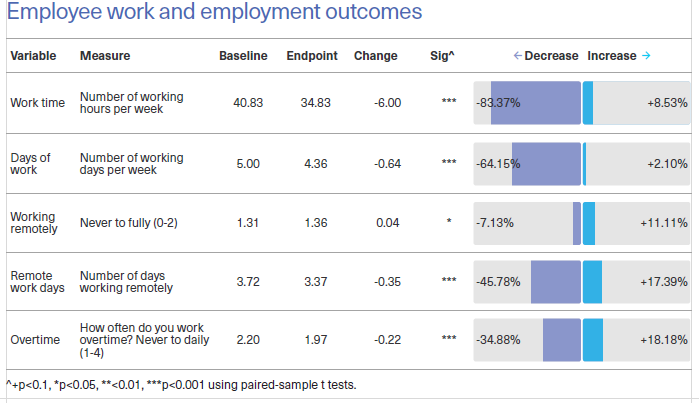

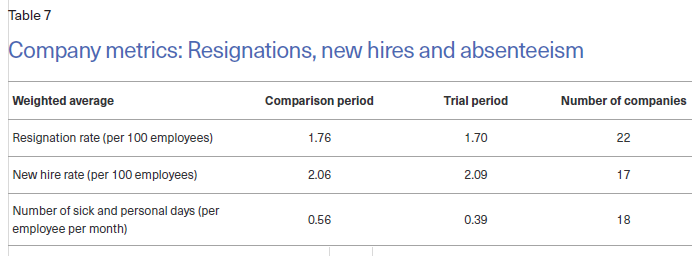


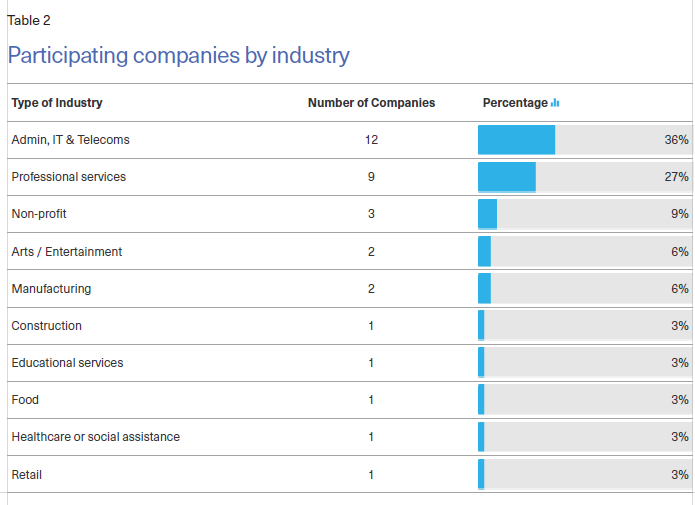
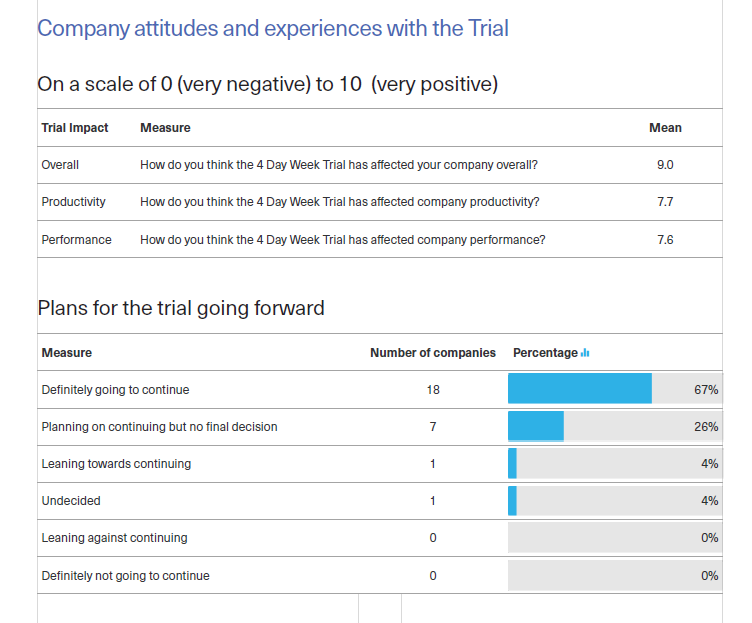
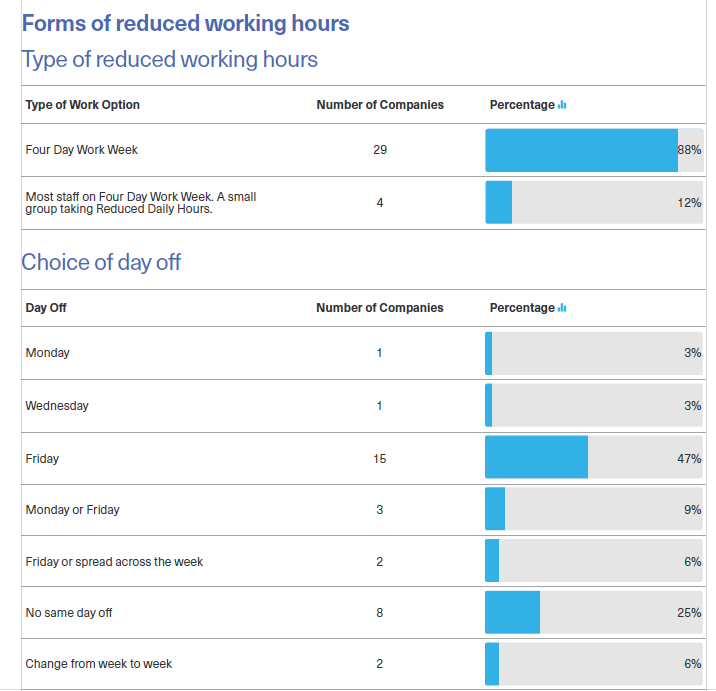

Thank you for this excellent summary. It answers all the questions I had, and it’s wonderful news.

It literally benefits everyone.
How many hours each day do people take to “wake up” and get going? I’d argue people are mostly useless up until close to lunch time. Then, people wind down when the day end is nearing, meaning companies are losing more productive hours each week.
I also would prefer to do longer days if I already dragged my ass out of bed. I don’t run for errands daily to make them shorter. I pile them up, then take 4-5 hours one day, vs 1 hour each day. I am already out doing it, might as well do them all, and have more time to relax at home other days.

Office workers aren’t very productive in general. We should focus on greater automation.

I’m an office worker. I work on automation.
Where’s that leave me? Who automates the automaters?
Also, from the office work I’ve seen, and compared against WFH, I’d agree to SOME reduced productivity - like 20% - but which is regained by allowing experienced people clear work time without interruption (which we get in remote work). The other 80% may actually be difficult to automate as trivially as required for any gains here.

And the concordant social safety nets and baseline wealth redistribution that benefit citizens over corporations.

